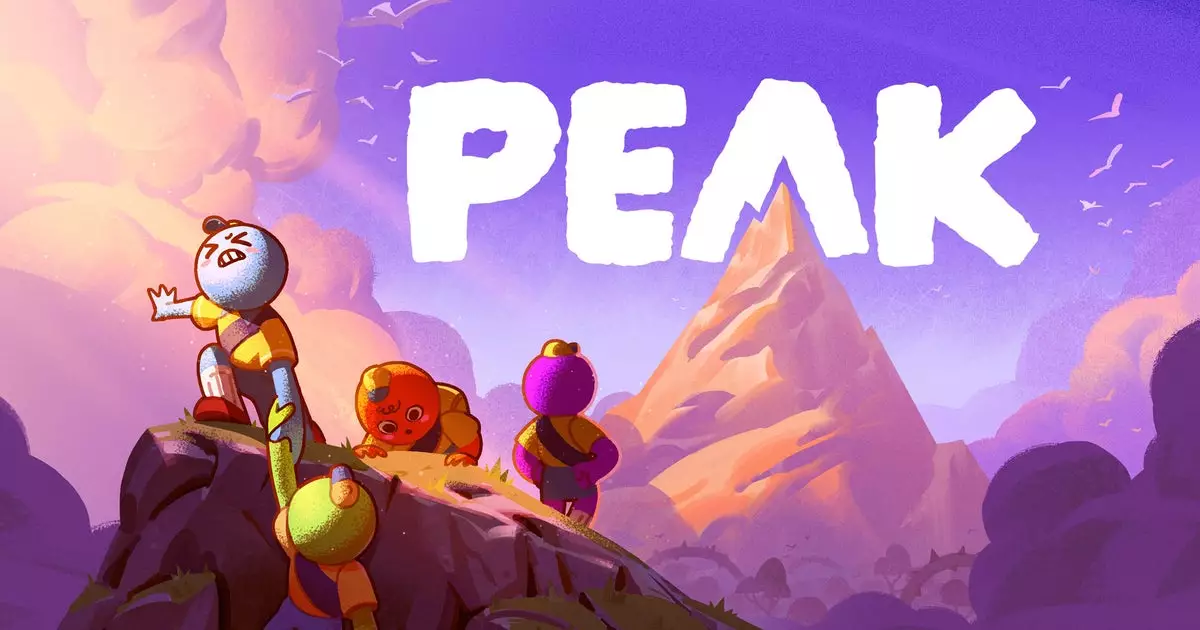In the ever-evolving landscape of video games, the genesis of a new title often springs from the most unexpected sources. One such beacon of inspiration is Peak, a co-op video game that invites players to engage in the whims of mountaineering—sometimes with triumphant highs, and other times with humorous lows. Unlike the frequently encountered tropes in gaming, Peak emerged from the fiery depths of rivalry and camaraderie during a one-month game jam. The adventure does not merely lie in the mechanics but in the burgeoning friendships formed during the creative chaos. Peak stands as a testament to the beauty that can arise when passionate developers converge, driven by a blend of jealousy and ambition.
From Jealousy to Collaboration
Nick Kaman, the head of Aggro Crab, revealed that the inception of Peak was largely fueled by a unique mixture of envy and excitement. Upon witnessing the impressive reception of Content Warning—a title created in a similar timeframe by Landfall—the team found themselves questioning the more traditional, drawn-out processes of game development they had been accustomed to. In a world where we often view success through the lens of prolonged effort, it is refreshing to encounter a tale that juxtaposes this narrative against the astonishing results birthed from a mere month of dedicated teamwork. With dwindling spirits after a grueling three-plus-year production of Another Crab’s Treasure, the allure to create something fresh quickly ensnared Kaman and his team. Driven to prove their prowess, they approached Landfall for this collaborative venture, resulting in a creative experience that would challenge preconceived notions of what game development could be.
A Unique Setting and Concept
The journey took an intriguing turn when Kaman, alongside his eager partners, set foot in Korea with their computers in tow, ready to immerse themselves in the unrelenting hustle of creation. They transformed an Airbnb into a temporary headquarters, which embodies the spirit of the indie game scene—the relentless drive to produce something extraordinary in a limited timeframe. However, this journey brought with it more than just keyboard clatter and energy drinks. The nascent concept of Peak was originally conceived in a hot tub in Sweden, illustrating that inspiration doesn’t always strike in predictable environments. The vision has transformed significantly from its early notions of open-world survival to the intriguing premise of hapless scouts navigating a comical yet challenging wilderness.
A Balance Between Work and Fun
Kaman and his collaborators forged a culture wherein hard work coexisted joyfully with vibrant interactions. This balance is crucial in maintaining creativity and morale, especially when producing a title in such a condensed timeframe. As they toiled away at developing Peak, they simultaneously indulged in culinary adventures throughout Korea, weaving discussions about the game into each meal. This blending of work and play offered an enriching experience, showcasing how vital collaboration can nurture the creative process and how camaraderie can spark innovative ideas. For Kaman, this meant grappling with intense work moments while cherishing unforgettable memories with teammates—each bite and laugh shaping the soul of Peak.
The Myth of Overnight Success
Despite Peak’s remarkable sales trajectory, it is imperative to approach the notion of effortless success with caution. The allure of a quick win can often cloud the harsh truths that accompany game development. Both Aggro Crab and Landfall possess years of experience, indicating that their triumphs stem not from the whims of spontaneity alone but rather from a keen understanding of their craft. The story of Peak serves not as a guidebook for aspiring developers seeking shortcuts but as an inspiring narrative that celebrates innovation born from intense collaboration and genuine passion. It reinforces the idea that although the gaming world can seem simplistic on the surface, its depth lies in the relationships forged, the experiments undertaken, and the lessons learned along the way.
Peak exemplifies the thrilling amalgamation of creativity, competition, and communal spirit. It challenges us to redefine our views on time, effort, and success within the gaming realm while advocating for a more collaborative approach to game design.

